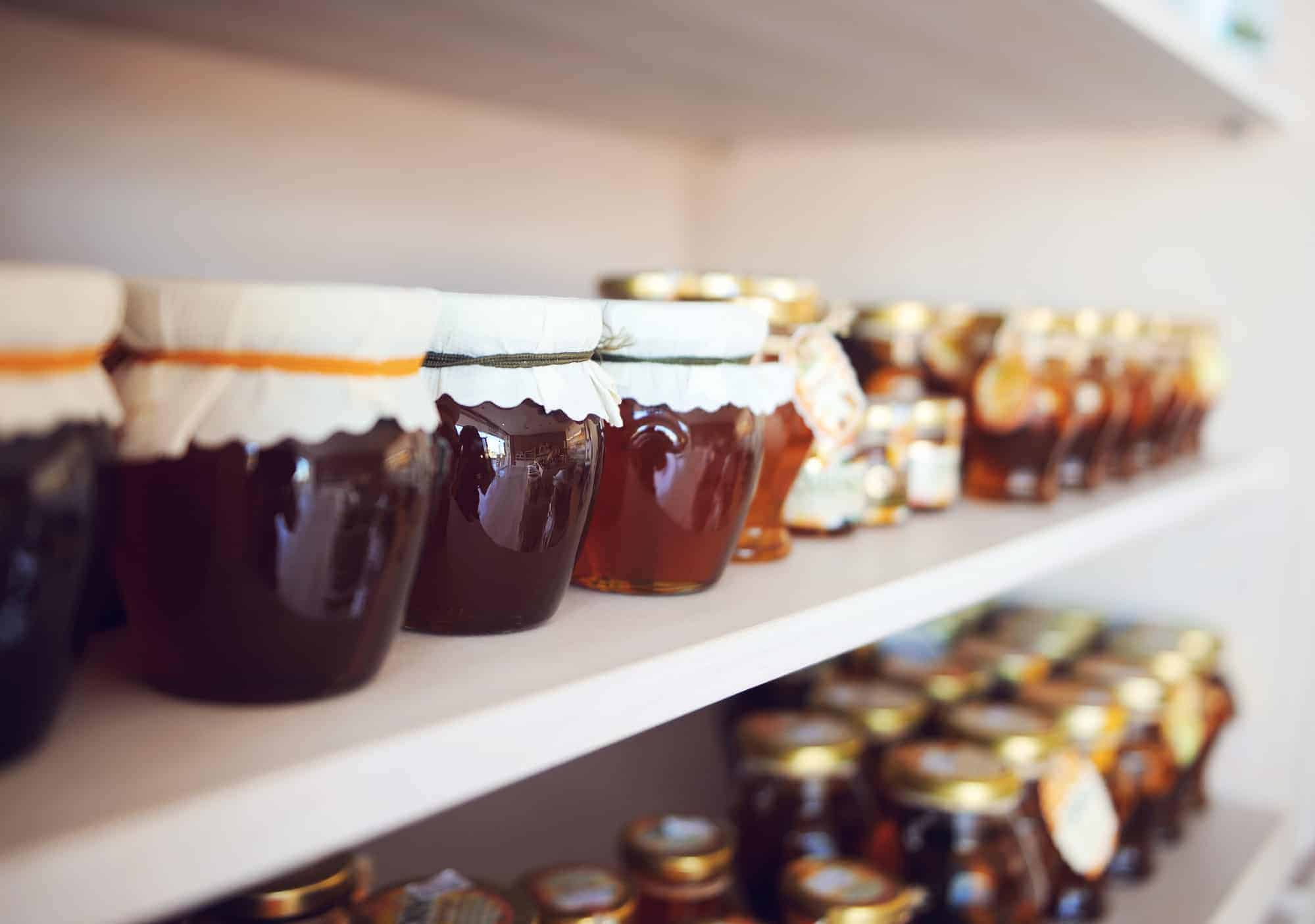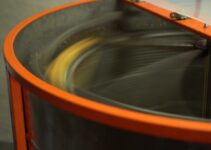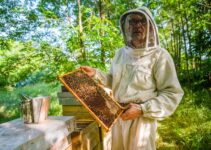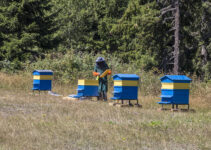Honey is one of nature’s most excellent preservers, as long as it’s properly stored and, if sealed, it can last thousands of years. Archaeologists have found sealed jars of honey in ancient Egyptian burial sites, and it’s still good to eat. But human error can mean that bacteria, water, and yeast get into the honey and cause it to ferment. However, how can you tell that your honey is fermented?
- The honey will have bubbles running through it. As the yeast eats the natural sugars, it’ll let of gasses, and you’ll begin to see tiny bubbles appearing.
- There is usually foam on top. If honey has been left to ferment for a while there will be a good layer of foam sitting on top.
- When you unscrew the cap, the honey will hiss. All the gases the yeast has produced while it’s been eating your honey will hiss as you release the pressure inside the jar by removing the lid.
- Smells mildly like wine or bread. As the honey ferments, it starts to convert to alcohol and can smell like wine, bread, or even slightly vinegary.
- if the honey has crystallized or has developed white feathery patterns through it, it is starting to ferment.
Fermented honey (also known as baker’s honey) has a more significant moisture content than most kinds of honey. This provides the natural yeasts and enzymes with the ability to begin the fermentation process. Humidity and heat provide the perfect environment to kick-start fermentation. So if you’ve ever accidentally left a jar at the back of a lovely warm cupboard only to find an incredibly messy ‘honey explosion’ later on, you may have unwittingly fermented your own honey!
Honey is made up of 80% sugar and 18% water, and it’s the massive sugar content that prevents the reproduction of micro-organisms. To get all ‘sciencey’ for a moment, the high sugar content of honey causes the pressure within itself to get high, which leads to something called an osmotic effect and forces water inside the cells of any micro-organisms to be pushed out.
Now you understand how to identify fermented honey through various practices, let’s dive deeper into the topic. Below we discuss what it tastes like, and various other helpful facts.
What does fermented honey taste like?
It depends on a few things, what bees were used, where the hive was kept, how and at what stage did the honey start fermenting? Some fermented honey can have a sharp or acidic taste because of the acetic acid formed. Some taste almost bready because of the type of yeast the honey has living in it, hence why it can be called baker’s honey. Whereas some fermented honey is surprisingly highly sort after, and high-class restaurants will pay top dollar for it because it has a complex floral flavor; tangy yet sweet and thick.
Can honey ferment in the hive?
As long as honey is capped and remains in the hive until you harvest it is nearly impossible for it to ferment. The worker bees dehydrate all the nectar that comes into the hive to a concentration of around 80% sugar. Then the everyday activity around the hive keeps it at the percent. If you waited a long time to extract the honey from the combs after you harvested them, then the honey could absorb moisture from the air and begin fermenting. If you do need to wait, or you don’t have time straight away, cover the combs and place them in a freezer to preserve them.
How to avoid fermented honey
To ensure that the honey has the correct concentration levels before bottling (crucial if you don’t want to explode any honey jars), use a refractometer calibrated precisely for honey. Most good bee suppliers have them for sale in their shops, or an experienced beekeeper near you might be willing to lend you one. Suppose the honey is just marginally high on water but relatively close to the desired concentration. In that case, you can use a dehydrator to get it the rest of the way to prevent fermentation from occurring.
Can you stop honey fermenting?
The best way to stop honey fermenting is by getting the moisture content down while it’s will in the combs. Many beekeepers swear by leaving the honey and comb on the supers in a small warm room with a dehumidifier running for several days. But it is critically important that the honey isn’t overheated. Otherwise, it can become muddy in appearance, and the flavor can become severely damaged. Most honeys, can take a fair amount of heat before this happens. But it’s a good idea to monitor it.
Many beekeepers and honey producers will heat their honey to 176F to kill off all the bacteria and yeast inside and kill any micro-organism daring to live in the produce.
Ensure all your jars are completely sterile and dry before adding your honey to them. In fact, it’s good practice to keep everything you use on your honey dry, which is the quickest way to end up with fermented honey.
Is fermented honey safe to eat?
Bacteria and yeast can get into the honey from dust, dirt, air pollen, and even the bees’ own gut, and if there is enough, it will make the honey go ‘bad’, which can be a health concern although a fairly uncommon one. But honey that has gone ‘bad’ is not the same as honey that has fermented. Many people don’t enjoy the taste of fermented honey, but it’s not going to hurt anyone. In fact, many people combine it with garlic to make a winter cure for colds, flu or as a condiment.
Conclusion
After reading the above, you should be knowledgeable on how to identify whether or not your honey is fermented and the reasons why. Many people believe that fermented foods are extremely bad for you. However, this couldn’t be any different with honey. So, now you know how to tell if your honey is fermented, why not check it out for yourself?




